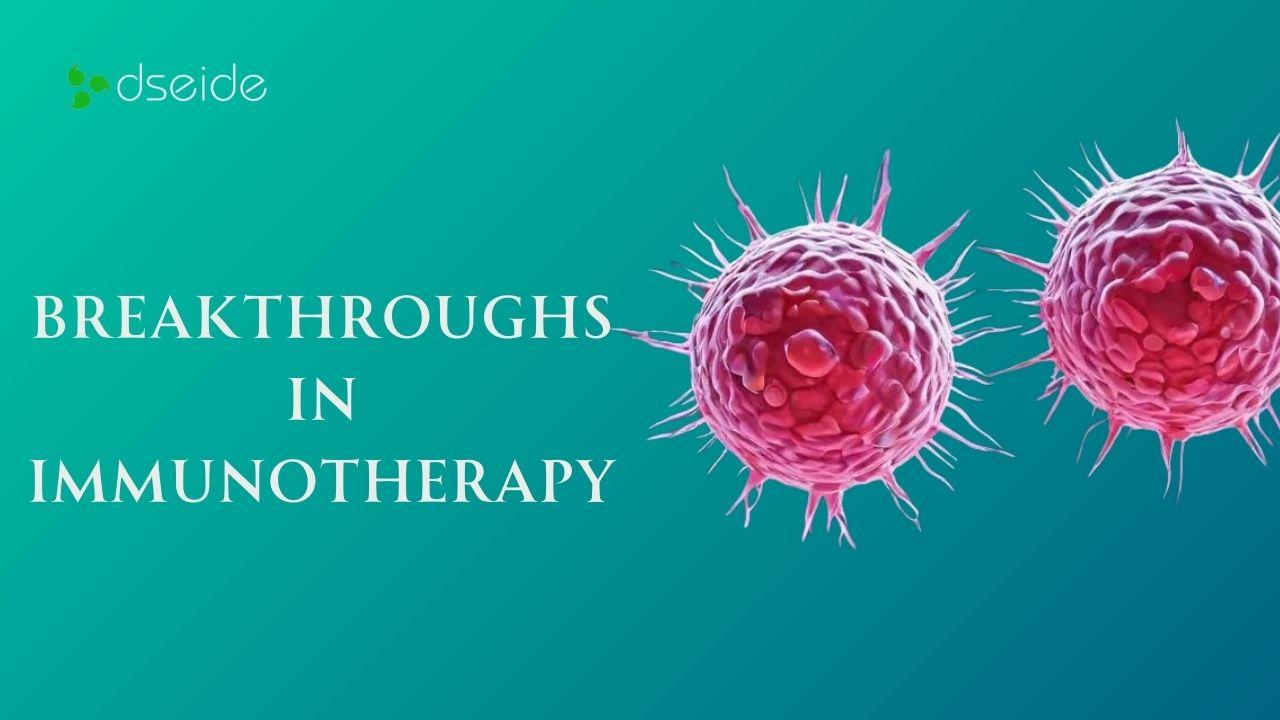Breakthroughs in Immunotherapy Immunotherapy continues to transform cancer treatment, with new therapies gaining approval and showing promise in clinical trials. One notable advancement is the development of CAR T-cell therapy, which has been expanded to treat various types of cancers, including solid tumors. Researchers are exploring ways to enhance the efficacy of CAR T-cell treatments by modifying T-cells to target specific cancer markers more effectively. This personalized approach aims to improve outcomes for patients with previously hard-to-treat cancers.
Early Detection Technologies Advancements in early detection technologies are playing a crucial role in improving cancer outcomes. Liquid biopsies, which analyze circulating tumor DNA in the blood, are becoming more sophisticated and are being used for early detection of various cancers, including lung, breast, and colorectal cancers. These non-invasive tests can help identify cancer at earlier stages, potentially leading to more effective treatments and better survival rates.
Targeted Therapies for Precision Medicine Targeted therapies are becoming increasingly prominent in oncology, as researchers identify specific genetic mutations associated with various cancers. New drugs designed to target these mutations are being developed and approved, leading to more personalized treatment plans. For instance, therapies targeting EGFR and ALK mutations in lung cancer are showing promising results, allowing for more effective management of the disease based on a patient’s genetic profile.
Advances in Radiation Therapy Recent advancements in radiation therapy techniques, such as stereotactic body radiation therapy (SBRT) and proton therapy, are improving treatment precision and reducing side effects. These innovative approaches allow for higher doses of radiation to be delivered directly to tumors while sparing surrounding healthy tissue. This is particularly beneficial for patients with tumors located near critical organs or structures.
Artificial Intelligence in Oncology Artificial intelligence (AI) is making significant inroads in oncology, with applications in diagnostics, treatment planning, and patient monitoring. AI algorithms are being developed to analyze imaging studies and pathology slides to identify cancerous cells more accurately and quickly than traditional methods. These technologies are helping pathologists and oncologists make more informed decisions and personalize treatment strategies.
Addressing Health Disparities in Cancer Care There is a growing focus on addressing health disparities in cancer care, particularly among underserved populations. Initiatives are being implemented to improve access to screening, treatment, and supportive services for marginalized groups. Community outreach programs aim to educate and engage individuals about cancer prevention and early detection, ultimately working towards reducing disparities in cancer outcomes.
Enhancements in Supportive Care As the focus on holistic cancer care increases, advancements in supportive care are also emerging. Research into managing treatment-related side effects, such as pain, nausea, and fatigue, is becoming a priority. Integrative approaches, including nutrition, physical therapy, and mental health support, are being incorporated into treatment plans to improve overall patient well-being and quality of life during and after cancer treatment.
These advancements reflect the dynamic nature of oncology, highlighting ongoing efforts to improve cancer diagnosis, treatment, and patient outcomes through innovation and research.
Early Detection Technologies Advancements in early detection technologies are playing a crucial role in improving cancer outcomes. Liquid biopsies, which analyze circulating tumor DNA in the blood, are becoming more sophisticated and are being used for early detection of various cancers, including lung, breast, and colorectal cancers. These non-invasive tests can help identify cancer at earlier stages, potentially leading to more effective treatments and better survival rates.
Targeted Therapies for Precision Medicine Targeted therapies are becoming increasingly prominent in oncology, as researchers identify specific genetic mutations associated with various cancers. New drugs designed to target these mutations are being developed and approved, leading to more personalized treatment plans. For instance, therapies targeting EGFR and ALK mutations in lung cancer are showing promising results, allowing for more effective management of the disease based on a patient’s genetic profile.
Advances in Radiation Therapy Recent advancements in radiation therapy techniques, such as stereotactic body radiation therapy (SBRT) and proton therapy, are improving treatment precision and reducing side effects. These innovative approaches allow for higher doses of radiation to be delivered directly to tumors while sparing surrounding healthy tissue. This is particularly beneficial for patients with tumors located near critical organs or structures.
Artificial Intelligence in Oncology Artificial intelligence (AI) is making significant inroads in oncology, with applications in diagnostics, treatment planning, and patient monitoring. AI algorithms are being developed to analyze imaging studies and pathology slides to identify cancerous cells more accurately and quickly than traditional methods. These technologies are helping pathologists and oncologists make more informed decisions and personalize treatment strategies.
Addressing Health Disparities in Cancer Care There is a growing focus on addressing health disparities in cancer care, particularly among underserved populations. Initiatives are being implemented to improve access to screening, treatment, and supportive services for marginalized groups. Community outreach programs aim to educate and engage individuals about cancer prevention and early detection, ultimately working towards reducing disparities in cancer outcomes.
Enhancements in Supportive Care As the focus on holistic cancer care increases, advancements in supportive care are also emerging. Research into managing treatment-related side effects, such as pain, nausea, and fatigue, is becoming a priority. Integrative approaches, including nutrition, physical therapy, and mental health support, are being incorporated into treatment plans to improve overall patient well-being and quality of life during and after cancer treatment.
These advancements reflect the dynamic nature of oncology, highlighting ongoing efforts to improve cancer diagnosis, treatment, and patient outcomes through innovation and research.
Breakthroughs in Immunotherapy Immunotherapy continues to transform cancer treatment, with new therapies gaining approval and showing promise in clinical trials. One notable advancement is the development of CAR T-cell therapy, which has been expanded to treat various types of cancers, including solid tumors. Researchers are exploring ways to enhance the efficacy of CAR T-cell treatments by modifying T-cells to target specific cancer markers more effectively. This personalized approach aims to improve outcomes for patients with previously hard-to-treat cancers.
Early Detection Technologies Advancements in early detection technologies are playing a crucial role in improving cancer outcomes. Liquid biopsies, which analyze circulating tumor DNA in the blood, are becoming more sophisticated and are being used for early detection of various cancers, including lung, breast, and colorectal cancers. These non-invasive tests can help identify cancer at earlier stages, potentially leading to more effective treatments and better survival rates.
Targeted Therapies for Precision Medicine Targeted therapies are becoming increasingly prominent in oncology, as researchers identify specific genetic mutations associated with various cancers. New drugs designed to target these mutations are being developed and approved, leading to more personalized treatment plans. For instance, therapies targeting EGFR and ALK mutations in lung cancer are showing promising results, allowing for more effective management of the disease based on a patient’s genetic profile.
Advances in Radiation Therapy Recent advancements in radiation therapy techniques, such as stereotactic body radiation therapy (SBRT) and proton therapy, are improving treatment precision and reducing side effects. These innovative approaches allow for higher doses of radiation to be delivered directly to tumors while sparing surrounding healthy tissue. This is particularly beneficial for patients with tumors located near critical organs or structures.
Artificial Intelligence in Oncology Artificial intelligence (AI) is making significant inroads in oncology, with applications in diagnostics, treatment planning, and patient monitoring. AI algorithms are being developed to analyze imaging studies and pathology slides to identify cancerous cells more accurately and quickly than traditional methods. These technologies are helping pathologists and oncologists make more informed decisions and personalize treatment strategies.
Addressing Health Disparities in Cancer Care There is a growing focus on addressing health disparities in cancer care, particularly among underserved populations. Initiatives are being implemented to improve access to screening, treatment, and supportive services for marginalized groups. Community outreach programs aim to educate and engage individuals about cancer prevention and early detection, ultimately working towards reducing disparities in cancer outcomes.
Enhancements in Supportive Care As the focus on holistic cancer care increases, advancements in supportive care are also emerging. Research into managing treatment-related side effects, such as pain, nausea, and fatigue, is becoming a priority. Integrative approaches, including nutrition, physical therapy, and mental health support, are being incorporated into treatment plans to improve overall patient well-being and quality of life during and after cancer treatment.
These advancements reflect the dynamic nature of oncology, highlighting ongoing efforts to improve cancer diagnosis, treatment, and patient outcomes through innovation and research.






